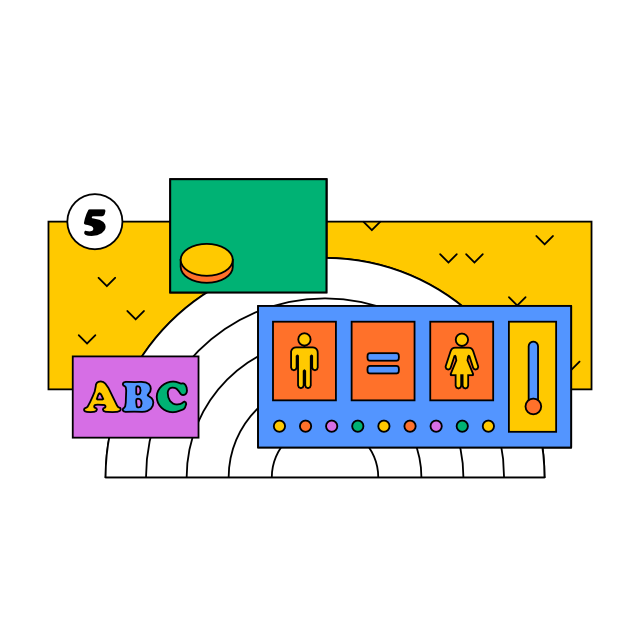SDG 5Gender equality
How can we put an end to violence against women as quickly as possible? How can we help women and girls to participate in political, economic, and public life?
Overview
It might not be that obvious in our latitudes. Women can vote, go to school, drive, work, and make independent decisions about their lives. Yet, there are still many disadvantages that men do not experience, or at least not as much. Even in the most developed countries, it is still rather difficult to find the work/family life balance as women still carry most of the responsibility for children and the household. Business and the whole of society are from the most part set up in a way that makes it difficult to come back after having a child. Moreover, every third woman in Western countries has experienced violence in her life.
The situation is of course much worse in sub-Saharan Africa, the Middle East, Oceania, and West Asia where girls and women still face rigid discrimination concerning their sexuality, access to education, the labour market, and political rights.
It is in everyone’s interest to address gender and other inequalities; if some groups of people face more difficult conditions, it is a disadvantage to us all. It is in our interest that men and women can participate equally not only in economic life, but also in childcare, and have equal conditions. If we exclude half the population from working life, we are unnecessarily holding back our economic growth.
Solution and Key Innovations
Given the urgency of the matter, gender is an issue addressed by a number of institutions. At the European level, The European Institute for Gender Equality (EIGE) is worth mentioning. It is an autonomous body of the European Union established to promote gender equality. The EIGE identifies gender inequalities, gathers information, and analyses the data. By providing practical, evidence-based information, it supports policy makers in their efforts to make genders more equal in order to improve the lives of all.
There are gender studies departments at many universities, such as the Linköping University in Sweden. A prominent university focusing on gender is the Finnish Tampere University, currently working on a project supported by the prestigious ERG grant. The key ambition of the research project is to establish new methodologies, concepts, and theories on inclusive representation, gender justice and democracy based on thorough empirical understanding of the gender and party politics at the European Parliament.
Let’s stay in the North for a bit, in Oslo. Curt Rice from the University of Oslo in his project set out to find out why fewer women than men apply for promotion in academia. The most important goal of the project was to increase the number of women Professors and Associate Professors at the University of Tromsø from the current 25% to 30%. Why do fewer women apply for promotion? It might be due to women’s lower self-esteem, but research is not clear on this. Some studies do support the idea that women have lower self-confidence, while others question such generalisation. Others claim that it is a systemic problem and that women are simply required to perform better to achieve the same standards as men.
Artificial intelligence is a very topical issue today. Researcher Gina Neff aims to contribute to the understanding of artificial intelligence in the context of society. Her research revolves around questions such as whether AI is gendered, whether it is possible that we are reproducing gender stereotypes through AI (have you ever wondered why voice assistants such as Siri or Alexa are female?) or how many women are involved in creating smart systems that have an impact on healthcare, security forces or education.
Judith Butler, the philosopher and feminist, is a key figure in feminism. She undermined the foundation of traditional feminism in her two books, Gender Trouble (1990) and Bodies That Matter (1993), by questioning the feministic definition of a woman.
According to Butler, traditional feminism has constructed an artificial notion of women so that it can enforce certain demands through it. However, such a construct excludes and degrades certain types of women (lesbian, childless, black women, non-Western women), which undermines feminism as a movement meant for all women.
Key Questions
- Can we break down the idea of a standard person so that no one is disadvantaged?
- Will we make it easier for women to participate in all aspects of political, economic, and public life?
- Can we stop violence against women?
- Will we make sure that women are rewarded in the same way as men for their work?
- Will policy makers start acknowledging the fact that women must more often put their careers on hold to take care of their family, which results in lower pensions?
Key Words
Gender, gender equality
Interesting Resources
- The Centre for Gender and Science has launched the One Size Doesn’t Fit All campaign which includes a number of activities focused on gender equality in research
- A study on why women’s pensions are significantly lower than those of men
- A text highlighting the fact that even though women produce more than half the world’s food, they only own about 20% of land
- Interesting facts and numbers on gender inequality
- The European Institute for Gender Equality (EIGE)
